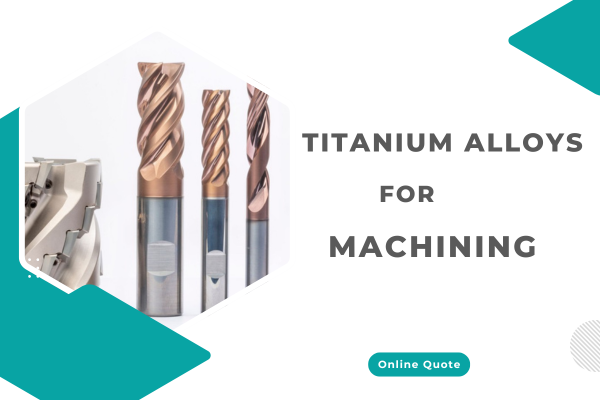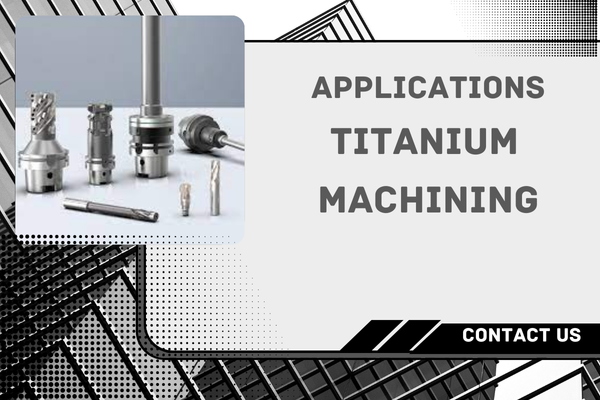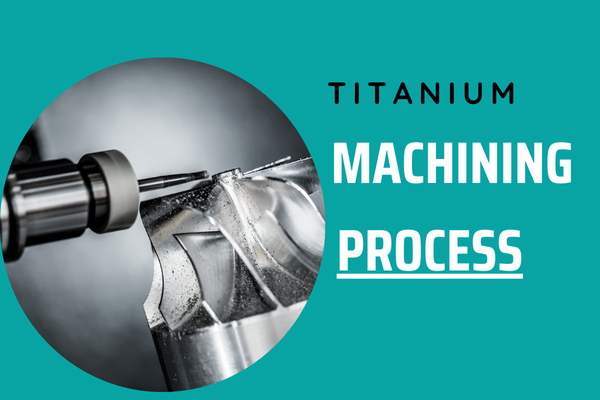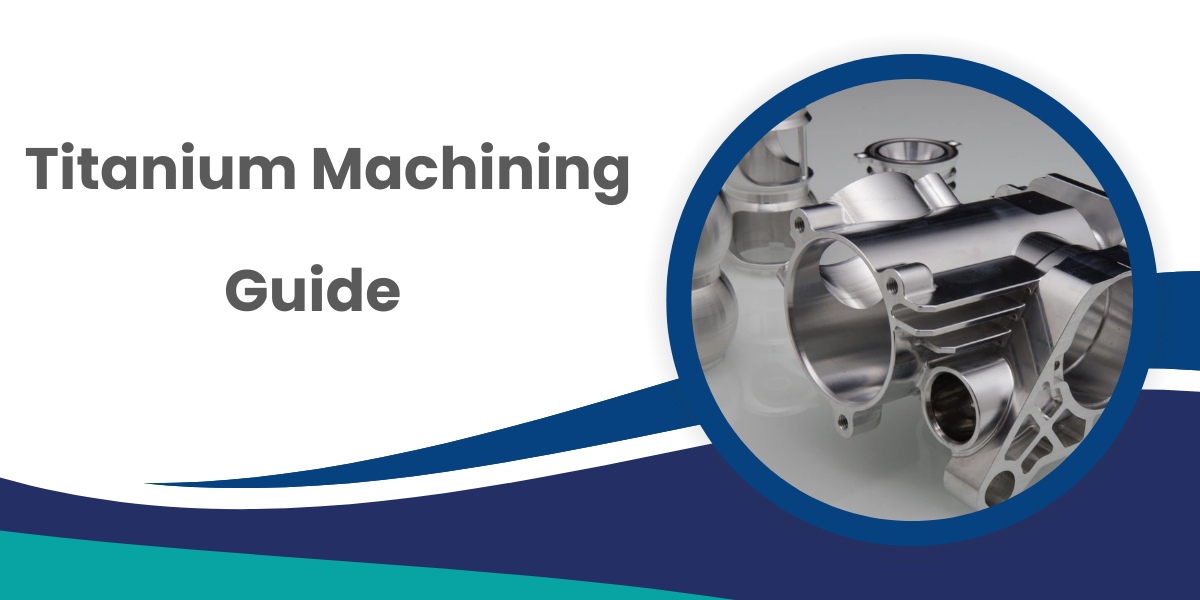Titanium is an amazing metal valued for its unique set of properties. For example, it provides excellent strength. Also, it is pretty lighter in weight. This is why; CNC titanium machining is highly regarded in applications such as aerospace and medical.
Unlike many metals, titanium exhibits remarkable resistance to corrosion. This happens when there is a thin, tenacious oxide layer which forms on the surface upon air exposure. Such a layer acts like a very powerful barrier that prevents aggressive factors from reaching the underlying metal.
Titanium also possesses an interesting attribute which is its biocompatibility. The human body easily accepts titanium implants. Because of this feature, titanium has become quite popular as the prime material for different medical uses ranging from bone implants to surgical instruments.
1. Understanding Titanium as A Machining Material
1.1 Titanium Alloys vs. Pure Titanium
Various grades of pure titanium (commercially pure grades 1-4) are available that provide a good balance between:
- Strength
- Ductility
- And formability.
However, if you compare pure titanium with other materials, its strength is low. Aluminum, vanadium or iron combines to make titanium alloys.
These alloys possess a wider range of mechanical properties than pure titanium. It includes higher strength and hardness.
Property | Pure Titanium | Titanium Alloys |
Tensile Strength (MPa) | 110-200 | 620-1200 |
Yield Strength (MPa) | 70-170 | 275-1035 |
Elongation (%) | 20-60 | 10-50 |
Density (g/cm³) | 4.5 | 4.4-4.9 |
List of Popular titanium Alloys:
- Ti-6Al-4V (Grade 5)
- Ti-6Al-2Sn-4Zr-2Mo (Grade 6)
- Near-Alpha Alloys (e.g., Ti-5Al-2.5Sn-ELI)
- Ti-5Al-2.5Sn (Grade 23)
1.2 Pure Titanium
Commercially pure titanium has another popular name; pure titanium (CP). It is available in four grades (1-4). These grades provide an optimum blend of strength, ductility and formability. Pure titanium is often used in applications where the metal shaping is paramount.
1.3 Titanium Alloys
Titanium alloys are made by adding other elements such as:
- Aluminum
- Vanadium
- Iron to titanium
These alloys have a wider variety of mechanical properties than pure titanium, including increased strength and hardness. There is more than one kind of titanium alloy; some of the common include:
- Alpha alloys
- Beta alloys
- Alpha-beta alloys
2. Types of Titanium Alloys for CNC Machining

2.1 Alpha Alloys
Alpha alloys are mainly made up of titanium in its hexagonal close-packed (HCP). These alloys are popular for their customization features.
Nevertheless, they possess the least strength compared to the remaining two types of titanium alloys. Alpha alloys are best to make parts such as:
- Heat exchangers
- Aerospace
- And chemical processing machinery.
2.2 Beta Alloys
Beta alloys, which are made up predominantly of beta phase titanium with a body centered cubic (BCC) crystal structure. Nevertheless, they generally have less ductility as well as increased weld difficulty compared to alpha or alpha-beta alloys. Applications of beta alloys are airframes and turbine blades in the aerospace industry.
2.3 Alpha-Beta Alloys
Alpha-beta alloys are actually just a blend of alpha as well as beta phases. The qualities of such mixtures can be controlled through regulating the quantities of each phase present within the microstructure.
Alpha-beta alloys strike a good balance between its strength, malleability and ability. These are the most common types of titanium alloy used today in various applications such as:
- Aircraft structures
- Pressure vessels
- Surgical implants.
Property | Pure Titanium | Alpha Alloys | Beta Alloys | Alpha-Beta Alloys |
Tensile Strength (MPa) | 110-200 | 275-620 | 760-1200 | 620-1035 |
Yield Strength (MPa) | 70-170 | 170-480 | 530-1035 | 275-890 |
Elongation (%) | 20-60 | 25-50 | 10-20 | 10-50 |
Density (g/cm³) | 4.5 | 4.4-4.7 | 4.7-4.8 | 4.4-4.9 |
3. Applications of Titanium in CNC Machining

3.1 Aerospace Industry
The high strength-to-weight ratio of titanium makes it important in the aerospace field. For instance, aircraft frames and fuselages are manufactured using titanium. This material is significantly lighter than traditional materials like steel.
Titanium machined parts show significant improvements by reducing fuel consumption. It also features several other benefits such as:
- Decreased weight
- Increased payload capabilities
- Improved overall aircraft performance.
Simultaneously, titanium, improves landing gear and engine components corrosion. These parts are often subjected to moisture and extreme temperature changes.
3.2 Medical Industry
Titanium’s biocompatibility finds extensive application in the medical industry. Therefore with hip or knee replacements and bone implants, titanium allows fusion with human body. It doesn’t cause complications.
Subsequently, titanium is ideal for dental implants because it is biocompatible. This feature ensures creating a strong foundation for artificial teeth.
3.3 Automotive Industry
Engine Valves and Exhaust Systems: To reduce weight, titanium parts help improve performance and fuel efficiency.
Suspension Springs: Titanium’s light features add strength to suspension springs.
3.4 Marine Applications
Boat Hulls and Propellers: Titanium is corrosion-resistant in saltwater. Hence, it is suitable for marine environments.
Seawater Desalination Equipment: Titanium is a good choice to use in seawater desalination systems.
3.5 Consumer Goods
Sports Equipment: Golf clubs and bike frames usually feature titanium.
Jewelry: High-end jewelry often contains this metal.
Get Your CNC Parts Into Production Today
Your Global Partner for Quality CNC Machining Services in China!
4. Machining Processes for Titanium

4.1 Tool Selection
When machining titanium, it is very important to make the right choice of tools that will help to achieve this in an efficient and high quality way. Some key factors to consider include:
Carbide-Tipped Tools:
HSS tools are not recommended for this purpose. The reason is titanium has high strength and abrasive nature. When machining titanium alloys using carbide tipped tools can be extra beneficial.
PVD Coating:
Carbide tools with a Physical Vapor Deposition (PVD) coating further enhance tool life and performance. Common PVD coatings for CNC machining titanium are as follows:
TiAIN (Titanium Aluminum Nitride): This has excellent wear resistance, high hardness, and good chemical stability particularly at elevated temperatures experienced by titanium during cutting process.
AlCrN (Aluminum Chromium Nitride): Another common choice is AlCrN coatings that have good abrasion resistance and can prevent chip welding.
Sharp Tools: Dull tools generate more heat and friction which increases work hardening as well as shortens tool life time. Proper maintenance of sharp cutting edges is crucial for achieving clean cuts, efficient chip formation, and longer lasting tools.
Chip Control:
In successful production of titanium it is absolutely necessary to control the chips properly. The following schemes must be considered:
Proper tool geometry: Efficient chip formation can be facilitated through appropriate chip breaker geometries and cutting tools with correct rake angles selection.
Higher Cutting Speeds: Higher speeds allow the chips cut cleanly off instead of welding onto the tool thereby preventing failure; however excessive speeds may lead to thermal fatigue which arises as a result of overheating. Achieving the best balance is critical here.
4.2 Coolant and Workholding
High-Pressure Coolant:
High-pressure coolant system helps in effective machining of titanium. There are several usages of coolants such as:
Heat Reduction – Coolant aimed at the cutting zone soaks and diffuses heat thereby minimizing heating due to chemical reactions with other compounds.
Chip Lubrication – As a lubricating medium, the coolant reduces friction between the tool and workpiece. It can reduce chip welding significantly and improve chip evacuation.
Workpiece Protection – The machined surface may be shielded against oxidation by the coolant used during machining operations.
Workholding:
It is agreeable that during machining, a good connection between the workpiece and machine is necessary. Workholding must minimize vibrations that will affect surface finish as well as shorten tool life. This may entail using clamps, fixtures or vises specifically designed for machining titanium.
4.3 Machine Tools and Cutting Strategies
The significance of robust machine tools characterized by high rigidity and low vibration cannot be overemphasized in successful titanium machining. Moreover, machining tools should have enough power to maintain a continuous feed even when cutting forces are higher.
In addition, its spindle has to operate at low speeds. This allows for high torque levels to optimize chip formation and minimize heat generation.
Maintaining a constant feed:
Consistency in the rate of feed during cutting is very important. Irregularities in feed can cause uneven chip formation, bad finish on surfaces as well as increased wear on tools. Controlled programmed feed rates while CNC machining titanium ensures consistent results are obtained.
Cutting Strategy:
The kind of cutting strategy employed can cause a lot variation on both machining efficiency and tool life. Some effective strategies for titanium consist of:
Trochoidal tool path:
This non-linear tool path reduces heat produced from chip dwell time within the cut zone and improves chip removal.
Climb milling: This approach avoids rubbing between the material being cut and the tool thereby reducing friction and minimizing heat production more than is possible with regular milling techniques.
5. Surface Finishing for Titanium Machined Parts
There are mainly the following methods for surface treatment of titanium machined parts:
| Method | Description |
|---|---|
| Anodic Oxidation | Creates a protective oxide layer through electrochemical processes. |
| Chemical Oxidation | Forms a thin oxide layer using chemical solutions. |
| Mechanical Grinding | Smoothens the surface by removing material through mechanical abrasion. |
| Chemical Polishing | Enhances surface finish by chemically removing material. |
| Sandblasting | Uses high-speed abrasive particles to clean and texture the surface. |
| Acid Washing | Cleans the surface using acidic solutions to remove contaminants. |
| Surface Nitriding | Introduces nitrogen into the surface to improve hardness and wear resistance. |
| Mirror Polishing | Produces a highly reflective surface by polishing. |
| Micro-Arc Oxidation | Forms a ceramic-like oxide layer using high voltage micro-arc discharges. |
6. Why titanium is difficult to machine?
Chemical Reactivity
During machining, titanium is highly reactive chemically, especially under high temperatures. As a result, the tool and workpiece atoms diffuse at the interface weakening the tool material thus enhancing its wear.
Low Thermal Conductivity
Unlike other metals such as steel that easily conducts heat away from the cutting area, Titanium has low thermal conductivity. This implies that heat is concentrated in one point during cutting. It leads to various problems:
Rapid Tool Wear: High temperatures soften the tool material hence quickening wear of the cutter’s edges.
Workpiece Warping: When localized heating causes uneven thermal expansion on a workpiece it may warp or distort.
Galling and Chip Welding
Galling and chip welding are results of titanium’s tendency to react with other materials when they are heated to extreme temperatures. Galling happens whenever there is sticking together of both work piece and tool leading to more friction. On the other hand, chip welding takes place when chips made from titanium get adhered onto a cutting tool.
7. Titanium Machining vs Aluminum
Titanium
Titanium is known to have unique strength characteristics. These features make it ideal for high-stressed components used in aerospace or sporting goods equipment. Moreover, it has got the highest degree of corrosion resistance particularly against salt water environments.
Aluminum
In contrast, aluminum has fewer complexities in CNC machining. In fact, its lower strength and higher thermal conduction enable a normal tool to be used in many instances. Aluminum provides moderate corrosion resistance.
Eventually the combination of titanium and aluminum relied on specific requirements such as;
- Strength needs
- Weight reduction
- Corrosion resistant
8. Titanium Machining Tips

Sharp Tools:
The main obstructer to efficient titanium machining is the use of tools that are not sharp. Inspect regularly and grind edges as required to maintain cutters in their best state. Use of cutting tools with sharp edges gives:
- Cleaner cuts
- Low heat generation
- Enhanced lifespan for cutters.
Use Coolants:
During machining, low thermal conductivity of titanium traps heat, causing tool wear and warping. This can be avoided by ensuring a high-pressure coolant system is available in the machining zone. Heat absorption by the coolant cuts down on friction between tool and workpiece surfaces.
Chip Control:
In successful machining of titanium alloys, effective control of chips is necessary. Employ cutting tools having appropriate rake angle and chip breaker geometry for better chip flow during formation and evacuation processes.
However, do not overdo it since too much speed will lead to excessive heating.
Climb Milling:
Instead of conventional milling whenever possible climb milling should be used . As compared with conventional milling techniques it reduces rubbing between the tool and the work piece. Moreover, it minimizes friction as well as heat generation.
Control Work Hardening:
Titanium has work hardening properties. Hence, every pass increases its hardness making subsequent cuts more difficult than previous ones. Consider slightly increasing feed rate during initial roughing operation.
9. Conclusion
While titanium is an excellent material for CNC machining, there are many challenges. However, choosing an experienced machining company can overcome these issues by using the right tools, coolant, and setting cutting speeds.RALLY has many years of experience in titanium machining and can provide you with high-quality, accurate titanium parts. Contact us today to learn more about how RALLY can meet your titanium machining needs!
Work with RALLY for CNC Machining Parts
Request a quote for new project today! No minimum order quantity and free samples available!







